|
|
|
Sort Order |
|
|
|
Items / Page
|
|
|
|
|
|
|
| Srl | Item |
| 1 |
ID:
147781


|
|
|
|
|
| Summary/Abstract |
UNTIL THE LATE FOURTEENTH CENTURY, the "Siberian File" of the rulers of the Muscovite State contained few facts obtained mostly from Novgorod sources. For the year 1364, for example, the Moscow chronicle (letopis') mentioned a march of the Novgorod army beyond the Urals and supplied the details: one part "fought along the Ob River and reached the sea" while the other was moving in the opposite direction, "up the river." This was the first mention of the Ob River in Russian chronicles while the term Siberia as a place-name was still unknown. It was in 1406 that the term Siberian Land first appeared in Russian chronicles and was associated with the murder in the lower reaches of the Tobol River of the Tatar khan Tokhtamysh, the eternal enemy of Muscovy.
|
|
|
|
|
|
|
|
|
|
|
|
|
|
|
|
| 2 |
ID:
138493


|
|
|
| 3 |
ID:
173303
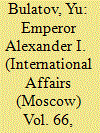

|
|
|
|
|
| Summary/Abstract |
IT IS A WELL-KNOWN historical fact that since the Rurikids there was a firm rule to include into the official title of the autocratic rulers of Russia all lands that belonged to the Muscovite State and all the territories attached to Russia, the population of which differed from the Great Russians by its national composition and religious affiliation. The Romanov dynasty, proclaimed the legal heir to the Grand Princes of Moscow, invariably observed this tradition. The crowned family was convinced that enumeration of the existing and newly acquired possessions in the official titles of the Russian monarchs spoke of Russia's might and greatness and confirmed its prestige both inside and outside the country.
|
|
|
|
|
|
|
|
|
|
|
|
|
|
|
|
| 4 |
ID:
146288


|
|
|
|
|
| Summary/Abstract |
THE GREAT NORTHERN WAR (1700-1721) created a new balance of power in the Baltics and made the Finnish file part of czarist Russia's foreign policy agenda. Having defeated Sweden, the Russian Empire got access to the Baltics and control over the coastal stretch between Riga and Vyborg. Under the Treaty of Nystad (1721), the state border between Russia and Sweden crossed the territory of the Grand Duchy of Finland that belonged to the Kingdom of Sweden. It was from that time on that the Finnish Question became an inalienable and component part of czarist policies.
|
|
|
|
|
|
|
|
|
|
|
|
|
|
|
|
| 5 |
ID:
185052


|
|
|
|
|
| Summary/Abstract |
THE SUCCESSFUL landing of British and American troops in Sicily in the summer of 1943 and the further course of Allied military operations against Nazi Germany and its satellites in the Mediterranean brought major political changes in the region. A coup on July 25, 1943, removed fascist dictator Benito Mussolini, who was replaced with Marshal Pietro Badoglio by order of King Victor Emmanuel III. The new government capitulated to the Allies; it severed all relations with Nazi Germany and on October 13, 1943, declared war on it. That same day, the Anti-Hitler coalition of the Soviet Union, the US, and Great Britain recognized Italy as a cobelligerent.
|
|
|
|
|
|
|
|
|
|
|
|
|
|
|
|
| 6 |
ID:
173283
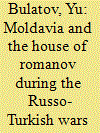

|
|
|
|
|
| Summary/Abstract |
ONE of the most important events in the development of Russian-Moldavian relations took place in the early 18th century in Istanbul where Russian Ambassador and resident of the Russian intelligence in Istanbul Pyotr Tolstoy met Dimitrie Cantemir, member of the Moldavian intellectual elite. According to the report compiled by the Russian diplomatic mission in the Turkish capital, Dimitrie Cantemir, born in 1673, graduate of the Academy of the Patriarchate of Constantinople, was a son of the Moldavian Hospodar (ruler) Constantin Cantemir. As a teenager, he had been separated, according to the "Oriental etiquette" and contrary to his will, from his parents and sent to Istanbul as a hostage at the court of the Turkish sultan.
|
|
|
|
|
|
|
|
|
|
|
|
|
|
|
|
| 7 |
ID:
144978
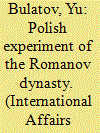

|
|
|
|
|
| Summary/Abstract |
TWO HUNDRED YEARS have passed since the Vienna Congress (1815) when Europe's leading monarchs led by the Russian autocrat Alexander I produced yet another scenario for the world following the routing of Napoleon Bonaparte's empire; the Congress determined also the status of Polish lands.
|
|
|
|
|
|
|
|
|
|
|
|
|
|
|
|
| 8 |
ID:
149730


|
|
|
|
|
| Summary/Abstract |
IT WAS UNDER KIEVAN PRINCE Igor (912-945) that Jewish tradesmen and artisans settled in Kozary, the lower part of his capital. Merchants whose business interests had regularly brought them to Kiev formed the core of the new colony. Russian chronicles contain no information about the newcomers: merchant colonies were common or even everyday facts of life in Rus. Indeed, Russian merchants set up similar colonies along the caravan routes between the East and the West. The agreements signed by Kievan Princes Oleg and Igor with Byzantium in 911 and 944 contained detailed descriptions of the conditions on which Russian merchants who came to Constantinople on business from Kiev and other Russian cities could stay in the Byzantine capital.
|
|
|
|
|
|
|
|
|
|
|
|
|
|
|
|
| 9 |
ID:
165645
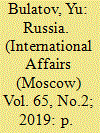

|
|
|
|
|
| Summary/Abstract |
IN THE LAST DAYS of czarist autocracy, the public displayed a lot of interest in the future political organization of Russia. People addressed all political parties with "Down with Autocracy!" and "Long Live the Republic!" slogans and wanted all political parties in the center and the provinces to present clear programs of Russia's future state order and national construction.
|
|
|
|
|
|
|
|
|
|
|
|
|
|
|
|
| 10 |
ID:
137307


|
|
|
|
|
| Summary/Abstract |
International Affairs: Yuri Alexeevich, for many years you have been professionally studying the history of Russia, including its ethno-political aspect. Is it possible to speak about Ukrainian citizens living on the territory of modern Ukraine as a single ethnos?
Yu. Bulatov: It is more correct to speak not about the Ukrainian people but the people of Ukraine. Why? Because the people of Ukraine is multiethnic: Ukrainians, Russians, Rusins, Poles, Tatars, Jews, etc. So it would not be quite correct to speak about Ukrainian citizens as a single Ukrainian ethnos.
|
|
|
|
|
|
|
|
|
|
|
|
|
|
|
|
| 11 |
ID:
177542
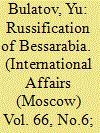

|
|
|
|
|
| Summary/Abstract |
IN FEBRUARY 1828, Emperor Nicholas I (1825-1855) signed the draft law Institution for Administering the Bessarabian Region that discontinued the experiment with the autonomy for the Pruth-Dniester interfluve. The "rights and freedoms" that Alexander I (1801-1825), his predecessor on the Russian throne, had granted to the local elite were replaced with the status of a province within the newly formed Novorossiyan-Bessarabian Governorship General, a new administrative unit in the South of Russia.
|
|
|
|
|
|
|
|
|
|
|
|
|
|
|
|
| 12 |
ID:
159293


|
|
|
|
|
| Summary/Abstract |
ON MAY 26, 1942, in London, Vyacheslav Molotov, People's Commissar for Foreign Affairs of the USSR, and Anthony Eden, Secretary of State for Foreign Affairs of Great Britain, signed the Anglo-Soviet Treaty of Alliance in the War Against Hitlerite Germany and Its Associates in Europe and of Collaboration and Mutual Assistance thereafter for 20 years. This treaty was "designed to confirm the stipulations of the agreement between His Majesty's Government in the United Kingdom and the Government of the Union of Soviet Socialist Republics for joint action in the war against Germany signed at Moscow, July 12, 1941." It was said in the new treaty that "the high contracting parties mutually undertake to afford one another military and other assistance and support of all kinds in war against Germany and all those States which are associated with her in acts of aggression in Europe... and undertake not to enter into any negotiations with the Hitlerite Government or any other government in Germany that does not clearly renounce all aggression intentions, and not to negotiate or conclude, except by mutual consent, any armistice or peace treaty with Germany." The Treaty signed by the foreign ministers of both countries expanded the temporal limits of allied relations and created a potential legal basis of further cooperation: "The high contracting parties, having regard to the interests of security of each of them, agree to work together in close and friendly collaboration after re-establishment of peace... take into account the interests of the United Nations ... and act in accordance with the two principles of not seeking territorial aggrandizement for themselves and of non-interference in the internal affairs of other States."
|
|
|
|
|
|
|
|
|
|
|
|
|
|
|
|
| 13 |
ID:
180748


|
|
|
|
|
| Summary/Abstract |
SOVIET and British leaders were informed by their intelligence services about Directive No. 41 that Hitler had signed on April 5, 1942. The directive confirmed that the Wehrmacht was ready to launch a large-scale offensive against the Red Army at the Soviet-German front in spring and summer of 1942: "Our aim is to wipe out the Soviets' remaining defense potential, and to cut them off, as far as possible, from their most important centers of war industry."
|
|
|
|
|
|
|
|
|
|
|
|
|
|
|
|
| 14 |
ID:
152692


|
|
|
|
|
| Summary/Abstract |
BY ITS ATTACK at the Soviet Union fascist Germany destroyed the international balance of power. The documents of the People's Commissariat for Foreign Affairs of the USSR (NKID SSSR) said that "on the strength of circumstances the Soviet Union and England became comrades-in-arms, that is, if not formal then the de facto allies at the time of war."1 On June 22, 1941, the day when Germany attacked the Soviet Union, Foreign Secretary of the UK Anthony Eden said to Soviet Ambassador to Great Britain Ivan Maysky that the declared war had not changed Britain's policies and that it would pour even more efforts into its struggle with Germany.2 On the same day, Prime Minister of Great Britain Winston Churchill said in his broadcasted address: "Any man or State who fights against Nazism will have our aid. Any man or State who marches with Hitler is our foe.... That is our policy and that is our declaration. It follows, therefore, that we shall give whatever help we can to Russia and to the Russian people."
|
|
|
|
|
|
|
|
|
|
|
|
|
|
|
|
| 15 |
ID:
157272


|
|
|
|
|
| Summary/Abstract |
JAPAN'S ATTACK on Pearl Harbor, the United States' naval base in Hawaii, on December 7, 1941, started large-scale military operations in the APR. In a few days, the correlation of forces in the eastern periphery of World War Two changed dramatically and the number of states fighting on both sides increased. On December 8-12, 1941, the United States, Great Britain, Australia, New Zealand, Canada and several other states declared war on Japan at sea and on land. On December 9, 1941, China, having declared war on Japan, Germany and Italy, launched land operations against Tokyo; two days later, Germany and Italy joined the fighting against the United States and turned World War Two into a global war.
|
|
|
|
|
|
|
|
|
|
|
|
|
|
|
|
| 16 |
ID:
181371


|
|
|
|
|
|
|
|